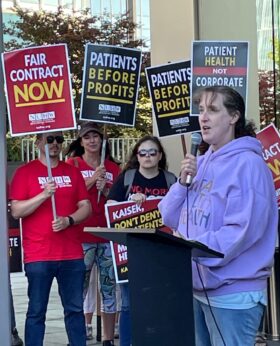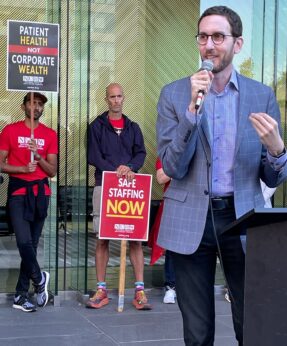
OAKLAND, Calif.—Over 2,000 mental health clinicians at Kaiser Permanente facilities in northern California and the Central Valley have entered the second week of their open-ended strike as they demand the giant healthcare nonprofit staff up to provide its millions of members timely, quality mental health care.
On Aug. 29 the psychologists, marriage and family therapists, social workers, and chemical dependency counselors, members of the National Union of Healthcare Workers, are to be joined by their colleagues in Hawaii.
Pickets at Kaiser’s flagship Oakland Medical Center wrapped up their first week on the picket lines on Aug. 19 with a march down the city’s main thoroughfare, Broadway Ave., to Kaiser’s corporate headquarters at the Ordway Building in downtown Oakland. There, they underscored their demands that Kaiser provide its members with quality mental health care and live up to state laws mandating timely access to care, including the HMO’s obligation to continue providing care even during a strike.

Leading off was patient Laura Bramble, who shared her open letter to Kaiser Associate Executive Director Dr. Sameer Awsare, who had asserted in a video that by striking the clinicians were hurting rather than helping their patients.
“Dr. Awsare,” she said, “your response to this action was pre-taped, and lacked both depth and compassion for anybody. Your outrage is noted. Now let me share my outrage with you.
“Kaiser’s systematic response of allowing these negotiations to continue without apparently any genuine interest in following through on prior promises or commitments, or following the law is, from my patient’s point of view, anxiety-provoking and appalling,” she said. “Canceling appointments days ahead of time demonstrates your corporate willingness to continue to deny care to patients – patients who like me are already fortunate enough to be in the system and need uninterrupted care. Patients who are not yet under the care of a therapist, who need to start treatment – they have already waited too damn long!”
Bramble challenged Awsare to meet with her, together with union representatives and members of the media, for an “authentic conversation” about patient healthcare needs and the importance of integrating mental health into what Kaiser markets as an integrated healthcare system, as well as living up to legal requirements that care for mental health have parity with physical health.
To cheers and applause, Mari González-Téllez, a clinician in Kaiser’s Transgender Clinic, told the crowd that at a time when over 25 pieces of anti-trans legislation are circulating in the U.S., “I just want you to know that we are striking not only for patient care but for our patients’ right to exist!”
Castigating Kaiser for failing to move beyond a message of “thoughts and prayers” and address the systemic issues facing the trans community, González-Téllez declared, “Trans lives matter! Your struggle is my struggle, is our struggle, and they will never, ever divide us!”
NUHW President Sal Rosselli recounted highlights of the clinicians’ 12-year struggle for quality patient care, from early actions including their offer to work with Kaiser to make the HMO “the best place” for behavioral healthcare – an offer Kaiser rejected – through years of strikes and negotiations aimed at improving patient care as well as meeting staff members’ needs.
Rosselli expressed great appreciation for the work of legislators including state Senator Scott Wiener, D-San Francisco, in introducing and shepherding through the legislative process measures such as Senate Bill 855, which mandates timely access to mental health care, and SB 221, which requires emergency care within 48 hours, and nonemergency care within 10 business days, unless the clinician says that’s not necessary.
He cited statements of support from state administrative leaders Lieutenant Governor Eleni Kounalakis and State Controller Betty Yee, as well as the joint statement by state Senate President pro tem Toni Atkins, D-San Diego, and Assembly Speaker Anthony Rendon, D-Lakewood, issued during the strike’s first week.
“Now,” Rosselli said, “we need Governor Gavin Newsom to follow up on his commitment to achieve universal health care in California, which must include mental health care.”

As Wiener took the microphone, he told the strikers, “I want to thank you, first of all, for saving lives and being there for our community day in and day out. But you’re not just on strike about the contract. You’re striking because you care like hell about the people that you serve and get help.”
Many strikes are about higher pay, healthcare, and other benefits, he said, “and that’s really important. But you’re not just demanding that, you are demanding that your patients be treated better. And I thank you for that!”
Expressing great appreciation for NUHW’s role in helping to get SB 855 and SB 221 passed with strong bipartisan support, Wiener recalled that “it’s exhilarating to pass a big law,” but emphasized that “enforcement and implementation” are crucial.
“So we’re holding the health plans accountable, we’re holding our agencies accountable to enforce this law and make sure it has meaning for people’s lives, and people get the healthcare they need to survive and thrive because that’s what it’s all about in the end.”
As the striking clinicians gathered across the front of the Ordway Building for a group photo, they chanted, “What do we want? Mental health care! When do we want it? Now!” and “How long will we be out? As long as it takes!”
Earlier in the day on Berkeley, Calif.-based listener-supported radio station KPFA’s UpFront program, Kaiser psychiatric social worker Naomi Johnson, who works at Kaiser Richmond, laid out the concerns she and her colleagues have about their ability to provide quality patient care.
“I’m out because I really care about my patients, I love the Richmond community,” she said. “But they’re not able to see me as often as they need to, and for as long as they need to, and I just want to be able to provide the care they deserve and need, and that they have because they pay their premiums – really high premiums, as a matter of fact – for Kaiser.”
Johnson sketched out a typical day: seeing six to 12 patients in “back-to-back-to-back appointments” of 45 to 50 minutes, with 10-minute intervals to write notes, prepare documents and take care of personal items – not counting meetings, consultations and supervision.
“If you talk with any therapist who’s maybe in private practice, or who may be working for another agency, what feels more manageable is probably seeing around four to six patients a day.”
Asked by host Brian Edwards-Tiekert how she responds to Kaiser’s claim that such a move would make things worse for patients, Johnson responded, “When we’re providing the best care, it’s when we have space and time and energy to be able to show up in the way that our patients deserve.”
Related Stories:
> Kaiser mental health clinicians in California strike for better patient service
> Kaiser mental health clinicians to start open-ended strike Aug. 15
> Kaiser Permanente mental health clinicians say California patients still being denied timely care
> Kaiser Permanente health clinicians hold one-day strike for racial justice










